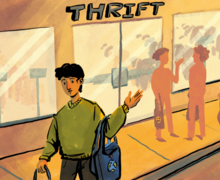Colleges in Pittsburgh channel grief into forward momentum, showing they will not ‘surrender’
Courtesy of Chani Silverman
Sitting in the middle of Carnegie Mellon University's campus lies a concrete fence that used to divide the school before it became coed. Today, it is a university tradition to paint the fence for important occasions or messages.
The Tree of Life Synagogue, where Saturday’s massacre occurred, is less than a 10-minute drive from both the University of Pittsburgh and the Carnegie Mellon University campuses.
The shooting, which is considered the deadliest anti-Semitic attack in U.S. history, killed 11 worshippers and injured six others on the Jewish Shabbat. But as people across the world mourn the tragedy, interfaith leaders, Rabbis, university administrators and students on these campuses are mobilizing.
Rabbi Shmuli Rothstein, the co-director of Chabad at Pitt, said that Saturday was “a very long day,” but that the community and university’s support has helped. Rothstein said administrators at Pitt reached out on Saturday afternoon and arranged for a counselor to help at their center.
Less than a week later, Rothstein is looking ahead to channel the sadness into something proactive. Instead of mourning the tragedy, he said, Rothstein is working with students to take that energy and bring light to it.
“In Judaism, when it comes to losing someone close to you, you have the mourning period … and at the same time we want to make sure that positivity comes out of it,” Rothstein said.
While his focus at the moment is on the students, Rothstein is working on a series of steps that he hopes will help everyone. The first step is making sure “things are more secure” so that “these situations don’t happen again.” The next plans include ensuring students have full access to counselors, as well as facilitating the student body to come together. Rothstein is currently organizing opportunities to do a single good deed, something that is specific to Judaism.
For Lena Vodovotz, a senior microbiology major at Pitt, it’s also about moving forward one step at a time. Vodovotz said she woke up to several texts on Saturday notifying her of the shooting, one of which came from a friend who was working at the hospital treating the victims. Last weekend was difficult for her, she said, and it was even more difficult when Vodovotz heard students going out later that night for “Halloweekend.”
“I could hear people going out,” Vodovotz said. “People were either not affected by it or were dealing with it in a different way from me.”
But, like others in the Jewish community, Vodovotz and her family have decided to look forward. Every Sunday night they eat dinner together at a Chinese restaurant that’s down the block from the Tree of Life synagogue. In unity and strength, the Vodovotz family still went to dinner on Sunday.
Rev. Brian Bennett, a campus pastor at Pitt and a member of CMU’s Council of Religious Advisors, said everyone on campus is clearly affected. Bennett said he opened up the Lutheran University Center for students on Saturday evening and kept it open through Sunday afternoon “just to be around others and just feel safe.” He said different faiths across campus addressed the massacre in services and gatherings.
“It’s something that folks in Pittsburgh don’t expect,” Bennett said. “It’s usually a pretty quiet area, especially the area around the universities here.”
While it’s normal for students to be angry at this time, Bennett said he is advising them to find positive outlets to cope. Right now, he said, students should be looking for ways to help the Jewish community — whether that is encouraging them to seek counseling, attend Shabbat or fundraising for the Tree of Life Synagogue.

Courtesy of Chani Silverman
Just a few blocks away, leaders of faith at CMU are following similar plans of action. Chani Silverman, the co-director of Chabad on campus at CMU, said university administrators quickly reached out to all of the Jewish organizations on campus and arranged a meeting to find ways to show solidarity.
On Monday night, students and community members came together to paint a fence in the middle of campus. The fence, which was originally put in place to separate CMU before it was coed, serves as a billboard for students, Silverman said. The concrete structure was painted completely black, with the Star of David painted white on each end and handprints all over.
Moving forward, Silverman said she’s working with students to ensure the shooting doesn’t hinder their faith. If the community doesn’t focus on moving forward, she said, we’re “surrendering.” Silverman and her husband, Rabbi Shlomo Silverman, are suggesting that students take their grief and see it at as a “springboard.”
“Just like when you have a dark room, you have to turn on a light that dispels the darkness,” Silverman said.
While those outside of the Jewish faith are also mourning, Rothstein said the best way to help is encouraging those in the Jewish community to engage in their faith right now. Non-Jewish students should encourage their Jewish friends attend to Shabbat at a local synagogue and wear their Star of David — expand their identity, he said.
“Everyone can get there. We can work on how we treat each other,” Rothstein said. “If you know someone … that has different customs, encourage them to explore those customs and be there for them.”
Published on November 1, 2018 at 12:40 am
Contact Lydia: lnilesst@syr.edu






